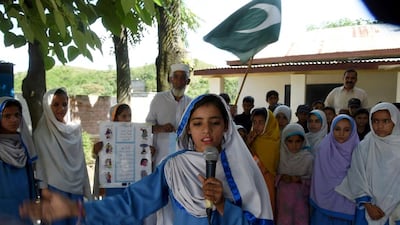Peshawar // About 100 women gathered in a community centre in Peshawar, the heart of Pakistan’s fabled north-west, are conversing in a dialect incomprehensible to the Pashtun ethnic group that dominates the region and whose language is Pashto.
Instead they are exchanging anecdotes and ideas in their native Hindko – literally, “the language of India” – at a conference organised to promote the increasingly marginalised language.
It is one of 72 tongues, including the official languages Urdu and English, spoken by Pakistan’s 200 million people, according to a 2014 parliamentary paper that classed 10 as either “in trouble” or “near extinction”.
According to scholars, Hindko’s decline as the foremost language of Peshawar city began in 1947 when Hindu and Sikh traders left after the partition of British India.
Hindko now has only about two million speakers across Pakistan compared to Pashto’s 26 million and has also become a minority language in the city of its birth.
“Years and years of political unrest in Pakistan’s north-western region and Afghanistan have adversely impacted our language and it has lost ground to Pashto,” said Salahudin, chief executive of the Gandhara Hindko Board which organised the conference.
Some three million mainly Pashto speakers fled to Peshawar from neighbouring Afghanistan over the past 35 years, while more recent arrivals are from other parts of Khyber Pakhtunkwa province.
The most endangered of Pakistan’s dialects are now spoken by only a few hundred people, such as Domaaki, an Indo-Aryan language confined to a handful of villages in remote northern Gilgit-Baltistan.
Even regional languages spoken by tens of millions such as Sindhi and Punjabi are no longer as vigorous as they once were.
“There is not a single newspaper or magazine published in Punjabi for the 60 million-plus Punjabi speakers,” according to the journalist Abbas Zaidi, despite it being the language of the revered Sufi poet Bulleh Shah and the native tongue of prime minister Nawaz Sharif.
English has been seen as the language of Pakistan’s elite since the country was founded. It is used at the highest official levels, while the majority of Pakistanis do not speak English well or at all, according to the linguist Tariq Rahman.
Urdu, the national tongue spoken at least as a second language by the majority of Pakistanis, has been relegated to the middle and lower levels of power, while the widely spoken regional languages are not even taught in schools.
“The result is an underclass that remains out of any public policy-making, its upward mobility increasingly limited, and harbouring a deep sense of inferiority,” wrote Urdu poet Harris Khalique in a research paper.
“A majority of Pakistanis is unable to recognise car registration plates, many road signs that are only in English, the signboards of shops and offices.”
Some activists have taken a stand, such as Rozi Khan Baraki, a champion of the Urmari language of South Waziristan tribal zone.
At its peak in the early 16th century, Urmari flourished across much of Afghanistan and what is now north-west Pakistan, but now has only about 50,000 speakers.
Mr Baraki said to avoid extinction, community elders have asked their people to “force their children to speak Urmari at homes, especially those who have married women who speak other languages”.
“Our next generation is threatened, this language is going to die if we don’t preserve it today,” he said.
Mr Rahman warned that a loss of linguistic diversity could have lasting ill effects.
Those who shift from their mother tongue to assimilate “try to become clones of another group – the one which they want to imitate, and lose respect for their former group,” he said.
Children find it difficult to communicate to their elders, while folk stories and music can also fade from memory.
“There are names of herbs and local names for fruit and animals that are lost. In some cases when you lose the name of the herb the use is also forgotten,” he said.
* Agence France-Presse

